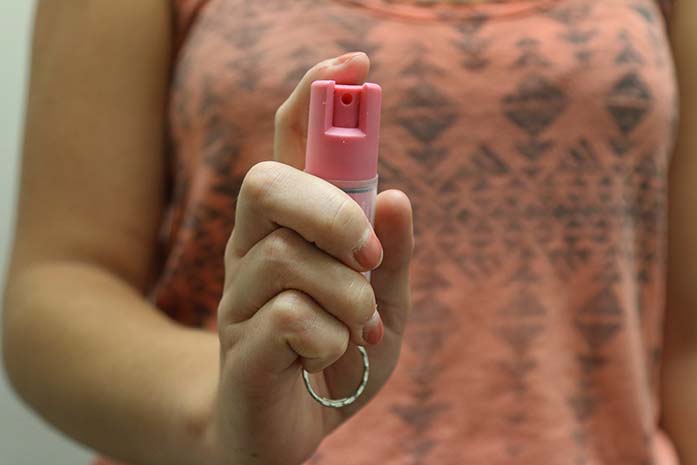By Naomi Hofferber
While various University of Iowa students make the decision to carry around items such as pepper spray or Tasers for self-defense, these items may not be as effective as many students think.
Alton Poole, UI police community outreach officer, said that if people plan on carrying a weapon such as Mace or a knife for self-defense, it’s best to know how to use it.
“For Mace, if you don’t know how to carry Mace, it doesn’t do you any good in your purse or in your pocket. What are you going to do when you’re accosted?” he said. “It’s only good if it’s in your hand, with the nozzle pointed in the right direction.”
Mace and pepper-spray containers typically have a safety lock on them and can take time to deploy. Tasers are on the list of banned weapons on campus, according to the state Board of Regents. Poole suggests alternative methods of self-defense other than weapons.
“For one, you don’t know the other person’s skill level, so now if you’re aggressed by someone and you don’t know their skill level, now it’s a weapon that could be taken away from you and used against you,” he said. “If you’re concerned about traveling to and from, then make arrangements. Call a cab, we have our Nite Ride service that now extends to all genders, ask a friend to drive you or escort, always have a [designated driver].”
Poole also said that self-defense classes, such as the Rape Aggression Defense class offered by the UI police, are better alternatives than carrying a weapon. The next class will be a four-day class beginning Oct. 3.
Linda Kroon, the director of the Women’s Resource and Action Center, said that while these items may not be as effective as intended, they can still have benefits.
“I know that for a lot of people, carrying something or having something with them can really help them feel more confident, feel like they’re ready for whatever might happen,” she said.
UI freshman Emily Wall said she carries pepper spray for security.
“It just makes me feel safer, even if I never have to use it,” she said.
Pepper spray, or oleoresin capsicum, can cause respiratory problems and temporary blindness when sprayed at an attacker.
Both Wall and her roommate in Slater own pepper spray, although Wall said that it could become a dangerous situation if the user was intoxicated.
“Having something on you of course is a personal choice,” Poole said. “I can’t tell a person what not to put on their person, unless it’s illegal. My recommendation of course would be to avoid bringing a weapon to a social event. If you can plan mitigating a risk, that’s 90 percent of self-protection.”
Kroon said she suggests focusing on changing the culture surrounding violence and sexual assault.
“If nobody thought it was OK for them to behave badly and attack someone else, we wouldn’t need to have all these protective measures,” she said. “I see the protective measures hopefully as a stop-gap in many ways.”
Kroon said she never wants people to be in a situation in which they feel responsible for something done to them.
“If someone else does something bad, it is not because you failed somehow,” she said.
The UI offers several events and programs throughout the year to help stand against sexual assault, including the “It’s On Us” campaign, supported by the UI Student Government, which began this past Monday.
“It’s not easy to do, to sort of change our thinking about everyone’s sort of thinking and attitudes,” Kroon said. “I do believe it’s possible. One of the examples I think of so often is it was a generation ago that nobody wore seat belts in their cars, and now we don’t even think twice about it.”



